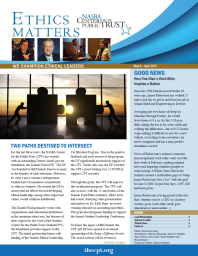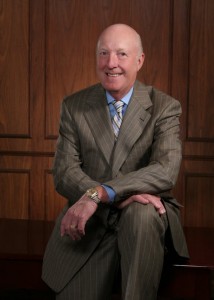Leadership Column: Leaders Dream! (Mar/Apr 2015)
Ethics Matters
March/April 2015
 Dreams create vision, which most effectively invites others to participate and share in an exciting future.
Dreams create vision, which most effectively invites others to participate and share in an exciting future.
Shared vision compels the establishment of, and commitment to, values which are built on the solid ethics rocks of truth, transparency and trust.
Values drive the purpose of an organization or movement, the very essence of the “why” employees, participants, or the marketplace, should pay any attention to what is being promoted or sold.
While most recognize the unforgettable phrase, “I have a dream,” of Dr. Martin Luther King, Jr.’s speech on August 28, 1963, at the Lincoln Memorial, few perhaps have heard or read the entire history-changing words delivered that day. Dr. King had already established himself as a great leader, not only of African-Americans, but of anyone under a yoke of unfairness, unequal treatment under the law, economic depravity and an unjust pathway to the pursuit of happiness. Dr. King embodied the “dream to purpose” principle of life-change, culture conversion, and magnanimity of all people based on such values as “beautiful symphony of brotherhood,” “all men are created equal,” and judgment “by the content of their character.”
As we turn the pages of history in our beloved country, the men and women who were being a difference claimed success only as it fulfilled their dreams of achieving a better life for all.
George Washington helped to draft our Constitution which began in a values centered statement:
“We the People of the United States, in Order to form a more perfect Union, establish Justice, insure domestic Tranquility, provide for the common defence, promote the general Welfare, and secure the Blessings of Liberty to ourselves and our Posterity, do ordain and establish this Constitution for the United States of America.”
Dr. Maya Angelou, poet, educator, historian, best-selling author, actress, playwright, civil-rights activist, producer and director, often pondered the “American Dream.” Her “dream to purpose” was simply based on the rock solid foundation of “freedom in all things… to go as far as ambition impels us, in work, in play, and religion, and even in love.”
Each of us can offer many examples of leaders whose dreams, while perhaps not fulfilled in their lifetimes, propelled significant change in people, in a country and in the world. Whether it’s a President Lincoln, Rosa Parks, Eleanor Roosevelt, or other dream-leaders, the commonality of great leaders is that they dream to achieve a great purpose.
I am convicted that the truest test of the greatness and positive influence of an organization, is whether it persists in chasing the dreams of its leaders based on values and virtues that lead to victory. Ken Collins, prolific business author, said it succinctly in “Great By Choice:”… “Do we give up on our dreams when we’ve been slammed by brutal facts? The greatest leaders we’ve studied throughout all our research cared as much about values as victory, as much about purpose as profit, as much about being useful as being successful. Their drive and standards are ultimately internal, rising from somewhere deep inside.”
 The CPT continues to be dream-fluenced, invites businesses, professions, and students to share our vision, and is committed to values which transform dreams into reality. Happy 10th Anniversary!
The CPT continues to be dream-fluenced, invites businesses, professions, and students to share our vision, and is committed to values which transform dreams into reality. Happy 10th Anniversary!
— Ad astra, per aspera
David A. Costello, CPA
CPT Board Chairman
